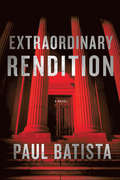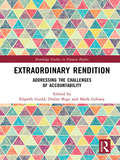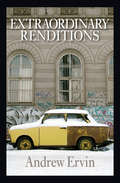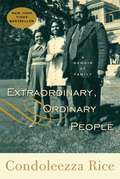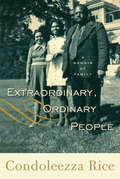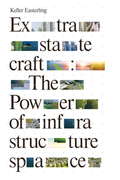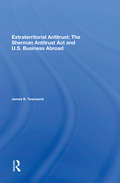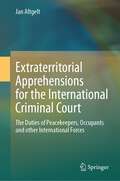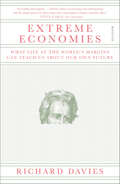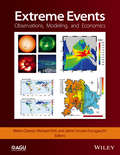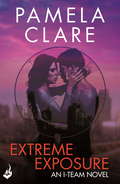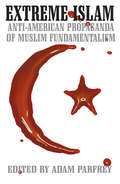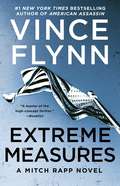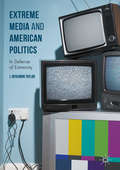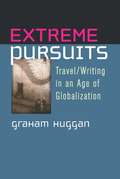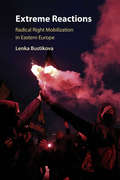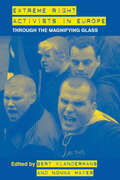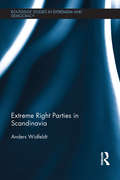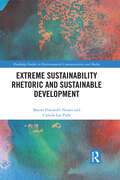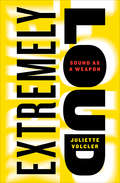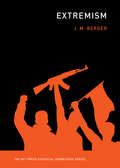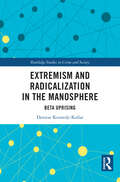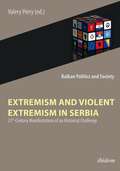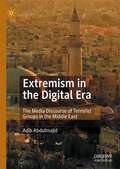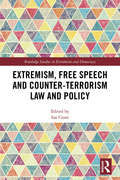- Table View
- List View
Extraordinary Rendition: A Novel
by Paul BatistaUSA Today best-selling authorWhen Ali Hussein, suspected terrorist and alleged banker for Al Qaeda, is finally transported from Guantanamo Bay to the US mainland to stand trial, many are stunned when Byron Carlos Johnson, a pre-eminent lawyer and son of a high-profile diplomat, volunteers to represent him. On principle, Johnson thought he was merely defending a man unjustly captured through rendition and water-boarded illegally. But Johnson soon learns that there is much more at stake than one man's civil rights. Hussein's intimate knowledge of key financial transactions could lead to the capture of or the unabated funding of the world's most dangerous terror cells. This makes Hussein the target of corrupt US intelligence forces on one side, and ruthless international terrorists on the other—and puts Byron Carlos Johnson squarely in the crosshairs of both.
Extraordinary Rendition: Addressing the Challenges of Accountability (Routledge Studies in Human Rights)
by Mark Gibney Elspeth Guild Didier BigoThe US led programme of extraordinary rendition created profound challenges for the international system of human rights protection and rule of law. This book examines the efforts of authorities in Europe and the US to re-establish rule of law and respect for human rights through the investigation of the program and its outcomes. The contributions to this volume examine the supranational and national inquiries into the US CIA-led extraordinary rendition and secret detention programme in Europe. The book takes as a starting point two recent and far-reaching developments in delivering accountability and establishing the truth: First, the publication of the executive summary of the US Senate Intelligence Committee (Feinstein) Report, and second, various European Court of Human Rights judgments regarding the complicity of several state parties and the incompatibility of those actions with the European Convention of Human Rights and Fundamental Freedoms (ECHR). The collective volume provides the first stock-taking review of the state of affairs in the quest for accountability, and identifies significant obstacles in going even further -- as international law demands. It will be vital reading for students and scholars in a wide range of areas, including international relations, international law, public policy and counter-terrorism studies.
Extraordinary Renditions
by Andrew ErvinSet in Budapest-a city marked by its rich cultural heritage, the scars of empire, the fresher wounds of industry, and the collateral damage of globalism-Extraordinary Renditions is the sweeping story of three equally tarnished expatriates. World-renowned composer and Holocaust survivor Lajos Harkályi has returned to Hungary to debut his final opera and share his mother's parting gift, the melody from a lullaby she sang as he was forced to leave his Hungarian home for the infamous Czech concentration camp Terezín. Private First Class Jonathan "Brutus" Gibson is being blackmailed by his commanding officer at the US Army base in Hungary, one of the infamous black-sites of the global War on Terror, and he must decide between going AWOL or risking his life to make an illegal firearms deal in Budapest. Aspiring musician Melanie Scholes is preparing for the most important performance of her career as a violinist in Harkályi's opera, but before she takes the stage she must extricate herself from a failing relationship and the inertia that threatens to consume her future. As their lives converge on Independence Day, they too will seek liberation-from the anguish of the Holocaust, the chains of blackmail, and the bonds of conformity.A formidable new voice in American fiction, Ervin tackles the big themes of war, prejudice, and art, lyrically examining the reverberations of unrest in today's central Europe, the United States' legacy abroad, and the resilience of the human spirit.
Extraordinary, Ordinary People: A Memoir Of Family
by Condoleezza RiceCondoleezza Rice has excelled as a diplomat, political scientist, and concert pianist. Her achievements run the gamut from helping to oversee the collapse of communism in Europe and the decline of the Soviet Union, to working to protect the country in the aftermath of 9-11, to becoming only the second woman - and the first black woman ever -- to serve as Secretary of State. But until she was 25 she never learned to swim. Not because she wouldn't have loved to, but because when she was a little girl in Birmingham, Alabama, Commissioner of Public Safety Bull Connor decided he'd rather shut down the city's pools than give black citizens access. Throughout the 1950's, Birmingham's black middle class largely succeeded in insulating their children from the most corrosive effects of racism, providing multiple support systems to ensure the next generation would live better than the last. But by 1963, when Rice was applying herself to her fourth grader's lessons, the situation had grown intolerable. Birmingham was an environment where blacks were expected to keep their head down and do what they were told -- or face violent consequences. That spring two bombs exploded in Rice's neighborhood amid a series of chilling Klu Klux Klan attacks. Months later, four young girls lost their lives in a particularly vicious bombing. So how was Rice able to achieve what she ultimately did? Her father, John, a minister and educator, instilled a love of sports and politics. Her mother, a teacher, developed Condoleezza's passion for piano and exposed her to the fine arts. From both, Rice learned the value of faith in the face of hardship and the importance of giving back to the community. Her parent's fierce unwillingness to set limits propelled her to the venerable halls of Stanford University, where she quickly rose through the ranks to become the university's second-in-command. An expert in Soviet and Eastern European Affairs, she played a leading role in U. S. policy as the Iron Curtain fell and the Soviet Union disintegrated. Less than a decade later, at the apex of the hotly contested 2000 presidential election, she received the exciting news just shortly before her father's death that she would go on to the White House as the first female National Security Advisor. As comfortable describing lighthearted family moments as she is recalling the poignancy of her mother's cancer battle and the heady challenge of going toe-to-toe with Soviet leaders, Rice holds nothing back in this remarkably candid telling. This is the story of Condoleezza Rice that has never been told, not that of an ultra-accomplished world leader, but of a little girl and a young woman -- trying to find her place in a sometimes hostile world and of two exceptional parents, and an extended family and community, that made all the difference.
Extraordinary, Ordinary People: A Memoir of Family
by Condoleezza RiceCondoleezza Rice has excelled as a diplomat, political scientist, and concert pianist. Her achievements run the gamut from helping to oversee the collapse of communism in Europe and the decline of the Soviet Union, to working to protect the country in the aftermath of 9-11, to becoming only the second woman - and the first black woman ever -- to serve as Secretary of State. But until she was 25 she never learned to swim. Not because she wouldn't have loved to, but because when she was a little girl in Birmingham, Alabama, Commissioner of Public Safety Bull Connor decided he'd rather shut down the city's pools than give black citizens access. Throughout the 1950's, Birmingham's black middle class largely succeeded in insulating their children from the most corrosive effects of racism, providing multiple support systems to ensure the next generation would live better than the last. But by 1963, when Rice was applying herself to her fourth grader's lessons, the situation had grown intolerable. Birmingham was an environment where blacks were expected to keep their head down and do what they were told -- or face violent consequences. That spring two bombs exploded in Rice's neighborhood amid a series of chilling Klu Klux Klan attacks. Months later, four young girls lost their lives in a particularly vicious bombing. So how was Rice able to achieve what she ultimately did? Her father, John, a minister and educator, instilled a love of sports and politics. Her mother, a teacher, developed Condoleezza's passion for piano and exposed her to the fine arts. From both, Rice learned the value of faith in the face of hardship and the importance of giving back to the community. Her parents' fierce unwillingness to set limits propelled her to the venerable halls of Stanford University, where she quickly rose through the ranks to become the university's second-in-command. An expert in Soviet and Eastern European Affairs, she played a leading role in U.S. policy as the Iron Curtain fell and the Soviet Union disintegrated. Less than a decade later, at the apex of the hotly contested 2000 presidential election, she received the exciting news - just shortly before her father's death - that she would go on to the White House as the first female National Security Advisor. As comfortable describing lighthearted family moments as she is recalling the poignancy of her mother's cancer battle and the heady challenge of going toe-to-toe with Soviet leaders, Rice holds nothing back in this remarkably candid telling. This is the story of Condoleezza Rice that has never been told, not that of an ultra-accomplished world leader, but of a little girl - and a young woman -- trying to find her place in a sometimes hostile world and of two exceptional parents, and an extended family and community, that made all the difference.From the Hardcover edition.
Extrastatecraft
by Keller EasterlingExtrastatecraft controls everyday life in the city: it's the key to power - and resistance - in the twenty-first century. Infrastructure is not only the underground pipes and cables controlling our cities. It also determines the hidden rules that structure the spaces all around us - free trade zones, smart cities, suburbs, and shopping malls. Extrastatecraft charts the emergent new powers controlling this space and shows how they extend beyond the reach of government. Keller Easterling explores areas of infrastructure with the greatest impact on our world - examining everything from standards for the thinness of credit cards to the urbanism of mobile telephony, the world's largest shared platform, to the "free zone," the most virulent new world city paradigm. In conclusion, she proposes some unexpected techniques for resisting power in the modern world. Extrastatecraft will change the way we think about urban spaces - and how we live in them.From the Hardcover edition.
Extraterritorial Antitrust: The Sherman Antitrust Act And U.s. Business Abroad
by James B TownsendThis book, the first unbiased investigation of the effects of extraterritorial antitrust on U.S. business abroad, examines the influence of the Sherman Antitrust Act on the market-entry strategy of U.S. multinational corporations and assesses the interaction of public interest and the law.
Extraterritorial Apprehensions for the International Criminal Court: The Duties of Peacekeepers, Occupants and other International Forces
by Jan AltgeltThe starting point of this book is the generally shared observation that in violence-torn areas of limited statehood, the civilian population is often subject to deliberate attacks. This violence often escalates to core crimes such as war crimes, crimes against humanity and even genocide. The International Criminal Court (ICC) could potentially deter such crimes. In order to do so, it largely depends on the cooperation of the states on the territory of which alleged core criminals operate. Since such states are often unwilling or unable to cooperate, the book explores whether the ICC could instead seek assistance from international forces such as UN peace support operations, UN-mandated missions, and belligerent occupants.The book covers, on the one hand, the law and practice of the UN Security Council with regard to mandating international forces to arrest and transfer alleged offenders to the ICC or to other international courts. On the other, it addresses to what extent international forces may or must hand alleged offenders over to the ICC, regardless of such mandates. More precisely, the book examines whether the duties to prosecute genocide, torture, enforced disappearance, grave breaches and other war crimes apply extraterritorially and – if so – whether international forces can discharge these duties by transferring suspects to the ICC.At the same time, the book addresses the limitations to such extraterritorial action: firstly, to what extent the prohibition of the use of force and the principle of territorial sovereignty restrict extraterritorial deprivations of liberty and transfer to the ICC. Secondly, it explores the restrictions and permissions that the law of occupation and other norms of international humanitarian law impose on such apprehensions and transfers. Finally, it discusses how international forces can uphold the right to liberty and security as well as the principle of non-refoulement when they extraterritorially apprehend ICC suspects. This also reflects the book’s relevance with regard to the more general debate on the extraterritorial application of human rights.
Extreme Economies: What Life at the World's Margins Can Teach Us About Our Own Future
by Richard DaviesA New Statesman best book of the year | New York Times Editors' Choice pickA Financial Times best economics book of 2019An accessible, story-driven look at the future of the global economy, written by a leading expertTo predict our future, we must look to the extremes. So argues the economist Richard Davies, who takes readers to the margins of the modern economy and beyond in his globe-trotting book. From a prison in rural Louisiana where inmates purchase drugs with prepaid cash cards to the poorest major city on earth, where residents buy clean water in plastic bags, from the world’s first digital state to a prefecture in Japan whose population is the oldest in the world, how these extreme economies function—most often well outside any official oversight—offers a glimpse of the forces that underlie human resilience, drive societies to failure, and will come to shape our collective future.While the people who inhabit these places have long been dismissed or ignored, Extreme Economies revives a foundational idea from medical science to turn the logic of modern economics on its head, arguing that the outlier economies are the place to learn about our own future. Whether following Punjabi migrants through the lawless Panamanian jungle or visiting a day-care for the elderly modeled after a casino, Davies brings a storyteller’s eye to places where the economy has been destroyed, distorted, and even turbocharged. In adapting to circumstances that would be unimaginable to most of us, the people he encounters along the way have helped to pioneer the economic infrastructure of the future.At once personal and keenly analytical, Extreme Economies is an epic travelogue for the age of global turbulence, shedding light on today’s most pressing economic questions.
Extreme Events
by Jaime Urrutia-Fucugauchi Mario Chavez Michael GhilThe monograph covers the fundamentals and the consequences of extreme geophysical phenomena like asteroid impacts, climatic change, earthquakes, tsunamis, hurricanes, landslides, volcanic eruptions, flooding, and space weather. This monograph also addresses their associated, local and worldwide socio-economic impacts. The understanding and modeling of these phenomena is critical to the development of timely worldwide strategies for the prediction of natural and anthropogenic extreme events, in order to mitigate their adverse consequences. This monograph is unique in as much as it is dedicated to recent theoretical, numerical and empirical developments that aim to improve: (i) the understanding, modeling and prediction of extreme events in the geosciences, and, (ii) the quantitative evaluation of their economic consequences. The emphasis is on coupled, integrative assessment of the physical phenomena and their socio-economic impacts. With its overarching theme, Extreme Events: Observations, Modeling and Economics will be relevant to and become an important tool for researchers and practitioners in the fields of hazard and risk analysis in general, as well as to those with a special interest in climate change, atmospheric and oceanic sciences, seismo-tectonics, hydrology, and space weather.
Extreme Exposure: I-Team 1 (I-Team #1)
by Pamela ClareFans of Suzanne Brockmann, Maya Banks, Christy Reece, Julie Ann Walker and Cindy Gerard will adore Pamela Clare's expertly plotted romantic suspense series, which sets the pages alight with sizzling chemistry. For tension, thrills, romance and passion take a spin with the I-Team.In the years since her child's father left her, Kara McMillan has kept men at bay. The hard-boiled journalist has vowed never to become vulnerable again, however lonely she feels. With his dangerous good looks, charm and power, Senator Reece Sheridan could have just about any woman he sets his piercing eyes on. But he's intrigued by only one: gutsy, sensual reporter Kara, who promises to be every bit the firebrand in bed that she is in print. But this is no fling. A sudden political scandal - and attempts on Kara's life - threaten to drive them apart. Yet maybe adversity will draw them into a bond even more intense than their steamy embraces...Sexy. Thrilling. Unputdownable. Take a wildly romantic ride with Pamela Clare's I-Team: Extreme Exposure, Hard Evidence, Unlawful Contact, Naked Edge, Breaking Point, Striking Distance, Seduction Game.
Extreme Islam
by Adam Parfrey"Here is a window inside the Jihad... presented here in its bare face without a distorting commentary."--Jeremy Glover, Headpress"(C)ontains essays and fascinating images that will render you serious, humbled and even a bit sympathetic... Extreme Islam's deranged carnival succeeds in shocking most when the 'extremists' themselves are lucid, poignant and poetic."--R.U. Sirius, LA Weekly
Extreme Measures: A Thriller (A Mitch Rapp Novel #11)
by Vince Flynn#1 New York Times bestselling phenomenon Vince Flynn delivers a white-knuckled rollercoaster ride of a novel featuring &“the best hero the thriller genre has to offer&” (The Real Book Spy) as Mitch Rapp wages a war against a new enemy with the help of a fellow soldier as dedicated—and as lethal—as they come.Counterterrorism operative Mitch Rapp and his colleague Mike Nash may have finally met their match. The CIA has intercepted two terrorist cells, but a third—led by a dangerous mastermind determined to become al-Qaeda&’s new leader—is believed to be on the loose. With such a terrifyingly deadly enemy out there, Rapp needs the best of the best by his side and he believes he has that with Nash. Together, they have made careers out of meeting violence with extreme violence and have never wavered in the top-secret fight against the war on terrorism. Both have been forced to lie to virtually every single person they care about, and both have soldiered on with the knowledge that their lethal tactics have saved thousands of lives. But certain leaders on Capitol Hill are pushing to have men like Rapp and Nash put on a short leash. And then one spring afternoon in Washington, DC, everything changes. With nonstop action and ripped-from-the-headlines writing, Extreme Measures is the political thriller of our time and proves once again that, &“in the world of black-ops thrillers, Mitch Rapp continues to be among the best of the best&” (Booklist, starred review).
Extreme Media and American Politics
by J. Benjamin TaylorThis book asks: what are extreme television media, and are they actually bad for American politics? Taylor explores these questions, and how these media affect political knowledge, trust, efficacy, tolerance, policy attitudes, and political behaviors. Using experiments and data from the National Annenberg Election Study, this book shows how extreme media create both positive and negative externalities in American politics. Many criticize these media because of their bombastic nature, but bombast and affect also create positive effects for some consumers. Previous research shows partisan media exacerbate polarization, and those findings are taken further on immigration policy here. However, they also increase political knowledge, increase internal efficacy, and cause their viewers to engage in informal political behaviors like political discussion and advocacy. The findings suggest there is much to be gained from these media market entrepreneurs, and we should be wary of painting with too broad a brush about their negative effects.
Extreme Pursuits
by Graham HugganRecent figures suggest that there will be 1. 6 billion arrivals at world airports by the year 2020. Extreme Pursuitslooks at the new conditions of global travel and the unease, even paranoia, that underlies them---at the opportunities they offer for alternative identities and their oscillation between remembered and anticipated states. Graham Huggan offers a provocative account of what is happening to travel at a time characterized by extremes of social and political instability in which adrenaline-filled travelers appear correspondingly determined to take risks. It includes discussions of the links between tourism and terrorism, of contemporary modes of disaster tourism, and of the writing that derives from these; but it also confirms the existence of more responsible forms of travel/writing that demonstrate awareness of a chronically endangered world. Extreme Pursuitsis the first study of its kind to link travel writing explicitly with structural changes in the global tourist industry. The book makes clear that travel writing can no longer take refuge in the classic distinctions (traveler versus tourist, foreigner versus native) on which it previously depended. Such distinctions---which were dubious in the first place---no longer make sense in an increasingly globalized world. Huggan argues accordingly that the category "travel writing" must include experimental ethnography and prose fiction; that it should concern itself with other kinds of travel practices, such as those related to Holocaust deportation and migrant labor; and that it should encompass representations of travelers and "traveling cultures" that appear in popular media, especially TV and film. Graham Huggan is Professor of Commonwealth and Postcolonial Literatures at the University of Leeds. He is the coauthor, with Patrick Holland, ofTourists with Typewriters: Critical Reflections on Contemporary Travel Writing(University of Michigan Press) and coauthor, with Helen Tiffin, ofPostcolonial Ecocriticism(Routledge). Illustration: "Shadow Wall," 2006 © Shaun Tan.
Extreme Reactions: Radical Right Mobilization in Eastern Europe
by Lenka BustikovaFocusing on the rising support for the populist right in Eastern Europe, this book examines how anger and resentment towards minorities is being utilized in politics. Bustikova details the process by which the acquisition of political power and demand for rights by ascendant minority groups precipitates a backlash of mobilization from the radical right. However, this book also argues that prejudice against minorities is not a sentiment exclusive to right-wing voters and is not the root cause of increasing support for the radical right. Rather, this study reveals variation in how minorities are accommodated by the government and explains the electoral successes and failures of radical right parties. By examining the capitalization on these feelings of discontent towards politically assertive minorities and with the governmental policies that yield to their demands, Bustikova exposes volatile, zeitgeist-dependent conditions under which once fringe right-wing parties have risen to prominent but precarious positions of power.
Extreme Right Activists in Europe: Through the magnifying glass (Extremism and Democracy)
by Bert Klandermans Nonna MayerSince the 1980s, one of the main political changes in Western Europe has been the electoral upsurge of extreme right-wing parties. However, while the electoral support of these movements has been studied extensively, their membership has largely been ignored. This book examines who joins the extreme right and why?Drawing upon extensive research and featuring contributions from distinguished social psychologists and political scientists, this book provides the most detailed comparative study yet published of the psychology of right-wing extremist activists. Countries discussed include Germany, The Netherlands, Italy, Belgium and France.
Extreme Right Parties in Scandinavia (Extremism and Democracy)
by Anders WidfeldtThis book provides an up-to-date account of extreme right parties in Denmark, Norway and Sweden. It seeks to explain why these parties have grown in support, and in Denmark and Norway reached positions of direct political influence. Following an analytical framework, in which explanatory factors on the demand- as well as supply-sides are identified, the book investigates a wide range of possible such factors. The account covers economic conditions, immigration and political trust, as well as the extent of the fascist and Nazi legacy in Scandinavia. Each of the three countries is then subject to an in-depth study. The origins, historical development, ideology, organisation and leadership of the relevant extreme right parties in each country are analysed thoroughly. The analysis draws on party documents and publications, such as party manifestos, as well as media sources, biographies and academic literature. The main argument of the book is that internal supply-side factors, that is factors within the parties themselves, are indispensable in order to understand variations in the success of extreme right parties. External conditions are not unimportant, but account for very little if the parties do not provide a political package that can tap the potential demand.
Extreme Sustainability Rhetoric and Sustainable Development (Routledge Studies in Environmental Communication and Media)
by Mauro Fracarolli Nunes Camila Lee ParkThis book considers the nature, causes, and consequences of extreme pro- and anti-sustainability rhetoric, exploring how and why the expressions of radical views on sustainability-related themes may prevent real sustainable development. Following a thorough introduction on sustainability rhetoric, on dialogue, and on the role played by ideologies in the building of environmental beliefs, Fracarolli Nunes and Lee Park examine positions and statements expressed or made by individuals, companies, governments, and NGOs in the last decades. The outcomes of these considerations lead to the classification of expressions in different categories of sustainability rhetoric, laying the groundwork for the development of a ‘sustainability spectrum’: a metric for the level of radicalization of sustainability positions, which ranges from apocalyptic views to ultimate denial. Through the combination of historical perspectives, theoretical frameworks, and conceptual developments, this book provides a foundation for a more informed and productive dialogue between radically opposing views on sustainability issues. This volume will be of great interest to students, scholars, and practitioners researching and working in the areas of environmental communication and media, environmental politics, and sustainable development.
Extremely Loud: Sound as a Weapon
by Juliette Volcler&“Everything you ever suspected or feared about music as a weapon, sound as torture . . . Disturbingly illuminating in the possible ramifications&” (Kirkus Reviews). In this troubling and wide-ranging account, acclaimed journalist Juliette Volcler looks at the long history of efforts by military and police forces to deploy sound against enemies, criminals, and law-abiding citizens. During the 2004 battle over the Iraqi city of Fallujah, US Marines bolted large speakers to the roofs of their Humvees, blasting AC/DC, Eminem, and Metallica songs through the city&’s narrow streets as part of a targeted psychological operation against militants that has now become standard practice in American military operations in Afghanistan. In the historic center of Brussels, nausea-inducing sound waves are unleashed to prevent teenagers from lingering after hours. High-decibel, &“nonlethal&” sonic weapons have become the tools of choice for crowd control at major political demonstrations from Gaza to Wall Street and as a form of torture at Guantanamo and elsewhere. In an insidious merger of music, technology, and political repression, loud sound has emerged in the last decade as an unlikely mechanism for intimidating individuals as well as controlling large groups. &“Thorough and well researched,&” Extremely Loud documents and interrogates this little-known modern phenomenon, exposing it as a sinister threat to the peace and quiet that societies have traditionally craved (Publishers Weekly). &“Extremely Loud makes you shiver, or cover your ears, at the technological buildup now at the service of the most sophisticated forms of repression.&” —Libération
Extremism (The MIT Press Essential Knowledge Series)
by J. M. BergerWhat extremism is, how extremist ideologies are constructed, and why extremism can escalate into violence. A rising tide of extremist movements threaten to destabilize civil societies around the globe. It has never been more important to understand extremism, yet the dictionary definition—a logical starting point in a search for understanding—tells us only that extremism is “the quality or state of being extreme.” In this volume in the MIT Press Essential Knowledge series, J. M. Berger offers a nuanced introduction to extremist movements, explaining what extremism is, how extremist ideologies are constructed, and why extremism can escalate into violence. Berger shows that although the ideological content of extremist movements varies widely, there are common structural elements. Berger, an expert on extremist movements and terrorism, explains that extremism arises from a perception of “us versus them,” intensified by the conviction that the success of “us” is inseparable from hostile acts against “them.” Extremism differs from ordinary unpleasantness—run-of-the-mill hatred and racism—by its sweeping rationalization of an insistence on violence. Berger illustrates his argument with case studies and examples from around the world and throughout history, from the destruction of Carthage by the Romans—often called “the first genocide”—to the apocalyptic jihadism of Al Qaeda, America's new “alt-right,” and the anti-Semitic conspiracy tract The Protocols of the Elders of Zion. He describes the evolution of identity movements, individual and group radicalization, and more. If we understand the causes of extremism, and the common elements of extremist movements, Berger says, we will be more effective in countering it.
Extremism and Radicalization in the Manosphere: Beta Uprising (Routledge Studies in Crime and Society)
by Deniese Kennedy-KollarThis book presents an analysis of the male supremacist ideology of the internet-based subculture known as the manosphere and examines the process of radicalization to violent extremism that occurs within the group. The manosphere is the online subculture comprised of several distinct groups who share a basic gender ideology that is misogynistic and anti-feminist in the extreme. The manosphere celebrates a toxic hegemonic masculinity that encourages sexual violence and portrays violence as an understandable response to a feminized culture that denigrates manhood. Evidence has shown that several recent cases of murder, mass murder, and rape involved offenders who participated in this subculture prior to engaging in their crimes. Through the use of quotes gathered directly from the websites and message boards frequented by individuals within the subculture, this book offers an in-depth analysis of the ideology of the manosphere, and the common attitudes, values, and beliefs promoted within the various groups that comprise the subculture. It will also present a theoretical perspective that may shed light on what draws men to these groups and the processes by which they become radicalized to the far right and violent extremism. This book will be of interest to scholars and students in criminology, sociology, and political science, and others interested in examining the manifestation and effects of the manosphere on crime and criminal justice.
Extremism and Violent Extremism in Serbia: 21st Century Manifestations of an Historical Challenge (Balkan Politics and Society #1)
by Valery PerryThis volume explores the issues of extremism and violent extremism in Serbia through research from a multitude of different interdisciplinary perspectives. The topic of violent extremism and radicalization leading to terror (VERLT) has grown as a field of policy and donor aid support, globally and in the western Balkans. This new focus has been manifest through both increased counterterrorism support as well as efforts to prevent and counter violent extremism (P-CVE)—activities which are often peacebuilding as well as democratization initiatives. The main manifestation of extremism of interest to foreign donors (and often domestic authorities) is ISIS-inspired Salafi jihadism. However, in many of the countries in the region, and in the case of Serbia, there are other forms of extremism—namely far-right nationalism, violent hooliganism, and neo-Nazi movements—that are considered to be more of a threat, particularly as they are often viewed as examples of ‘normalized’ political expression. In addition, these extremisms can magnify one another through a process of reciprocal radicalization and interconnected spirals of exclusion, marginalization, grievance, and perceived victimhood.This volume explores the issue as evident on the ground in Serbia in 2017 and 2018, using fresh and original research and perspectives that demonstrate that Serbia is at risk of many types of extremism, which are interconnected and can best be prevented by achieving the liberal, democratic, rights-based reforms that have remained elusive for more than two decades.
Extremism in the Digital Era: The Media Discourse of Terrorist Groups in the Middle East
by Adib AbdulmajidThis book constitutes a journey into the obscure field of sectarian-guided discourses of radical Islamist groups. It provides new insights into the ideological mechanisms utilized by such organizations to incite sectarian conflicts and recruit local and foreign guardians to their alleged cause. This book examines diverse aspects and dimensions of the discourses of Sunni-based ISIS and Shia-based al-Hashd al-Shaabi and explores manipulative and ideological discursive strategies utilized by media outlets associated with these groups. It delves into linguistic and contextual activities, implicit and explicit messages within the discourses of various media outlets operating in the heart of the Middle East. It also scrutinizes and explains aspects of politicization, religionization and sectarianization within the media discourse of terrorist groups in the digital era.
Extremism, Free Speech and Counter-Terrorism Law and Policy (Extremism and Democracy)
by Ian CramThis edited collection addresses a number of free speech vs security concerns that are engaged by counter-terrorism law and policy makers across a number of liberal democracies, and explores the delicate balance between free speech and the censoring of views that promote hatred or clash with fundamental democratic values. It does this by looking at the perspectives and level of disagreement between those who consider today’s counter-terrorism and extremism strategies to be a soft and liberal approach, and those who believe these strategies disproportionately impact freedom of expression and association and non-violent political dissent. The contributors include academics, practicing lawyers, and think-tank analysts who examine whether universities and schools incubators of violent radicalism and debate, and whether the views of ‘extremist’ speakers and hate preachers need to be censored. Outside the UK, critical discussion of the regulation of counter-terrorism, extremism, and free speech in other liberal democracies is also offered. This book will be of great interest to researchers and practitioners with interests in extremism, terrorism, civil rights, and freedom of speech.
